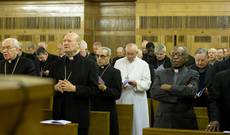POPE'S LATIN AMERICAN ROOTS LEAD TO CONCRETE FAITH
By Giovanna Chirri
10 marzo, 16:00 (ANSA) - Vatican City, March 10 - In August, Pope Francis
went to Lampedusa and threw a wreath of flowers into the sea in
memory of those who died while trying to reach a new life.
(ANSA) - Vatican City, March 10 - In August, Pope Francis
went to Lampedusa and threw a wreath of flowers into the sea in
memory of those who died while trying to reach a new life.With civilian authorities stretched to a minimum, Lampedusa Mayor Giusy Nicolini was nearly incredulous that a pope - the bishop who everyone calls Don Franco - would concern himself with Lampedusa.
Pope Francis puts refugees - the poorest of the poor on earth - at the centre of the agenda of his pontificate. He takes them from the periphery of the world and makes them the centre of his Church's concerns.
"We are a society that has forgotten the experience of crying, of 'suffering with'...the globalization of indifference," said the pope. "Did anyone in the world cry today for these brothers?" the pope asked regarding the deaths at sea.
A large part of Pope Francis's theology is made clear by these two moments in Lampedusa. For the Latin American Jesuit who ascended to Saint Peter's throne, the periphery is a theological concept. And the mercy that the world needs now more than ever - in the image of God's mercy - implies the capacity to suffer with each other, to take on each other's pain.
Hence, periphery and mercy spring forth before a pastoral or social program, and come directly from the "theology of proximity" which is typical of the new pope. Proximity, and the ability to experience the pain of another, already attempts passage from theology to the ministry.
For example, when reflecting on divorced and remarried couples excluded from the sacraments - in preparation for the Church's synod on the family - the consistory listened to invitations from the pope and speaker Cardinal Walter Kasper to bear the pain of failed marriages, to bring this pain into the communion of the Church, into the life of the Church. Family, not only for the divorced and remarried, is a test case for an inclusive Church that welcomes and forgives, a Church that is not a "customs house" clashing against each life situation with bans that follow rigid "casuistry". Also the choice of the poor is a theological concept: the pope, in his Evangelii Gaudium (Joy of the Gospel) - but not only there, given that he says it almost daily - states that the entire journey of redemption is marked by the poor, and calls for a co-responsibility for the common good of all. The poor are faced with the advance of a new individualist paganism, a paganism which often also dons ecclesiastical robes, when "spiritual worldliness" corrupts the Church.
Thus theological concepts of the periphery, the poor and closeness converge in the pope's dream of a Church with open doors, that meets humanity starting from the material and spiritual margins. A Church that is able to denounce the "culture of waste", to take on the many who have been "thrown away" - who are weaker and more fragile; a Church that can take offence at a world that receives a percentage point movement of the stock market as a tragedy, but ignores the old man who dies of hunger. It is this theology of the poor that is woven through the pope's message on the world economy and peace. The theology of Pope Francis, observed the fellow Jesuit Giampaolo Salvini, "reveals his Latin American roots".
"The [Latin American] theological and ministerial concern regards the 'concrete effectiveness of the gospel message in history', [whereas] the European theologians - according to the Latin Americans - discuss what should be done, (but) don't do it," recalls Father Salvini.
"It is thus an invitation to the reality of the faith that Pope Francis, an Argentinian, addresses to the faithful of the entire world," explained Salvini. ([email protected]) http://popefrancisnewsapp.com/










